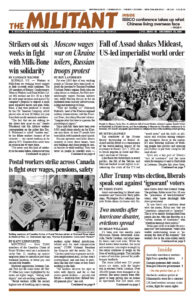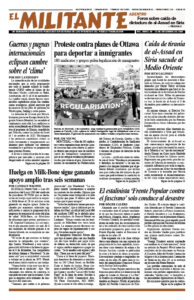For over 1,000 days of war, working people in Ukraine have tenaciously resisted the invasion by Russian President Vladimir Putin’s regime. Both sides are using drones as weapons, but Kyiv overwhelmingly targets Russian military sites, while Moscow focuses its fire on residential areas and key infrastructure, killing and maiming civilians.
“They are hunting us,” Oleksandr Prokudin, head of the Kherson regional military administration, told the Financial Times, describing Moscow’s drones. “Imagine what that does to a person, the psychological impact.”
Since mid-July there have been over 9,500 small-drone attacks on the Kherson area alone. At least 37 people have been killed, with hundreds more injured.
Russian operators send killer drones remotely to hover above homes, buzz into buildings and chase people in cars, on bicycles or while walking. They rain terror on people in crowded areas — markets, gas stations, cafés, post offices and aid distribution centers.
Kherson was captured by Russian forces shortly after their Feb. 24, 2022, invasion, but the occupying forces faced widespread protests by residents. After nine months the city was liberated by Ukrainian forces.
After not hearing drones for an hour, Serhiy left his Kherson apartment in early November. He stepped on a “petal,” one of the small anti-personnel mines dropped by drones in gardens or playgrounds. “I fell to the ground and then I noticed that I was missing my foot,” he told the Financial Times from a hospital bed.
Everyone in the area knows someone who was killed, wounded or is lucky to have survived one of the drone attacks, he said.
Swarms of drones often circle homes “like birds,” said Tetyana Aksenchuk from the nearby village of Veletenske. “If they see any movement, they immediately attack.”
Incendiary bombs are also dropped to set homes and fields alight. Aksenchuk was badly injured from another drone attack while fighting one of these fires. Ambulances coming to treat her were hit by more drones with several medics injured and one driver burned to death.
Aksenchuk lost her lower left arm and may lose her shattered left leg. The cost of surgery, let alone a possible prosthetic limb, is well beyond her means.
The aerial barrages have forced more civilians to leave the area. Out of 250,000 Kherson residents before the war, only 60,000 remain.
Many now carry small drone detectors to alert them about danger hovering nearby. Others only travel at night without lights.
Moscow steps up attacks
Ukrainian President Volodymyr Zelensky said Dec. 8 that 43,000 Ukrainian soldiers have died in the war so far, with 370,000 wounded. About half of the wounded have been able to recover enough to return to the front, he added. Courageous rescue operations, conducted by Ukrainian medics under fire from Moscow’s forces, have ensured a high rate of recoveries.
By contrast, workers in uniform in the Russian army are sent to storm Ukrainian positions in “meat grinder” attacks with little regard for casualties and with the dead and injured often left on the battlefield. A far smaller portion of Russian wounded get to a hospital.
In a Dec. 5 video appeal made in a Russian hospital, some of Moscow’s soldiers, shown on crutches or in handcuffs, complained about their officers forcing them back into combat before their treatment and recovery is over. Those who refused to go were charged with desertion.
The war has cost working people in Russia over 700,000 dead or wounded, as Putin drives to seize more territory.
Moscow keeps its casualty figures top secret. But Anna Tsivilyova, a relative of Putin and a deputy defense minister, accidentally exposed the scale of the deaths. She admitted authorities had received 48,000 DNA test requests from families trying to find missing soldiers.
Alexei Gorinov, a former Moscow politician and Putin critic, was the first to be jailed by the Kremlin under its wartime censorship laws for opposing the invasion. He was back in court Nov. 29 to hear that his seven-year sentence was extended by three years.
“I never thought I would live to see such a level of degradation of my country’s political system and its foreign policy,” he said in a courtroom statement. The war is causing the “deprivation and suffering of millions of people on a level unprecedented since World War II. We cannot remain silent.”
Many thousands of Russian people have paid “with our freedom, and for some, with our lives” for opposing the war, he said. He urged others to speak out, “Let us stop this bloody, needless slaughter.”

